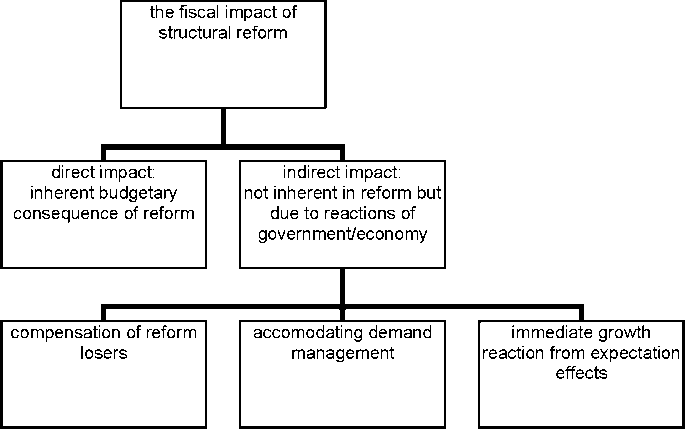Classification of fiscal effects
In the context of a macroeconomic analysis based on a country panel it is hardly possible to
precisely differentiate between the different “stories” being told about the evolution of budgetary
policy over a reform cycle (as summarized in figure 1). However, the following properties of
reform cycles may offer insights:
While a deterioration of the cyclically adjusted deficit in the course of reforms may be related to
either the direct reform consequences, to demand management considerations or to the
compensation aspect, a more detailed look at specific categories of the budget may be helpful to
differentiate: If, for example, an increase in social spending were behind the deficit deterioration
this could be regarded to back the compensation story. Conversely, a largely unspecific increase
in the deficit during reform processes tends to support rather the demand management view.
Furthermore, if reforms touch the budget mainly via business cycle effects this should be
detectable from cyclical variables such as growth, output gap or - more directly and scrutinized
explicitly in the following empirical steps - from sentiment indicators.
Figure 1: Classification of budgetary effects of structural reforms

137
More intriguing information
1. Delayed Manifestation of T ransurethral Syndrome as a Complication of T ransurethral Prostatic Resection2. A Review of Kuhnian and Lakatosian “Explanations” in Economics
3. Short Term Memory May Be the Depletion of the Readily Releasable Pool of Presynaptic Neurotransmitter Vesicles
4. The Mathematical Components of Engineering
5. Towards a Mirror System for the Development of Socially-Mediated Skills
6. Spousal Labor Market Effects from Government Health Insurance: Evidence from a Veterans Affairs Expansion
7. The name is absent
8. Ability grouping in the secondary school: attitudes of teachers of practically based subjects
9. Macro-regional evaluation of the Structural Funds using the HERMIN modelling framework
10. sycnoιogιcaι spaces